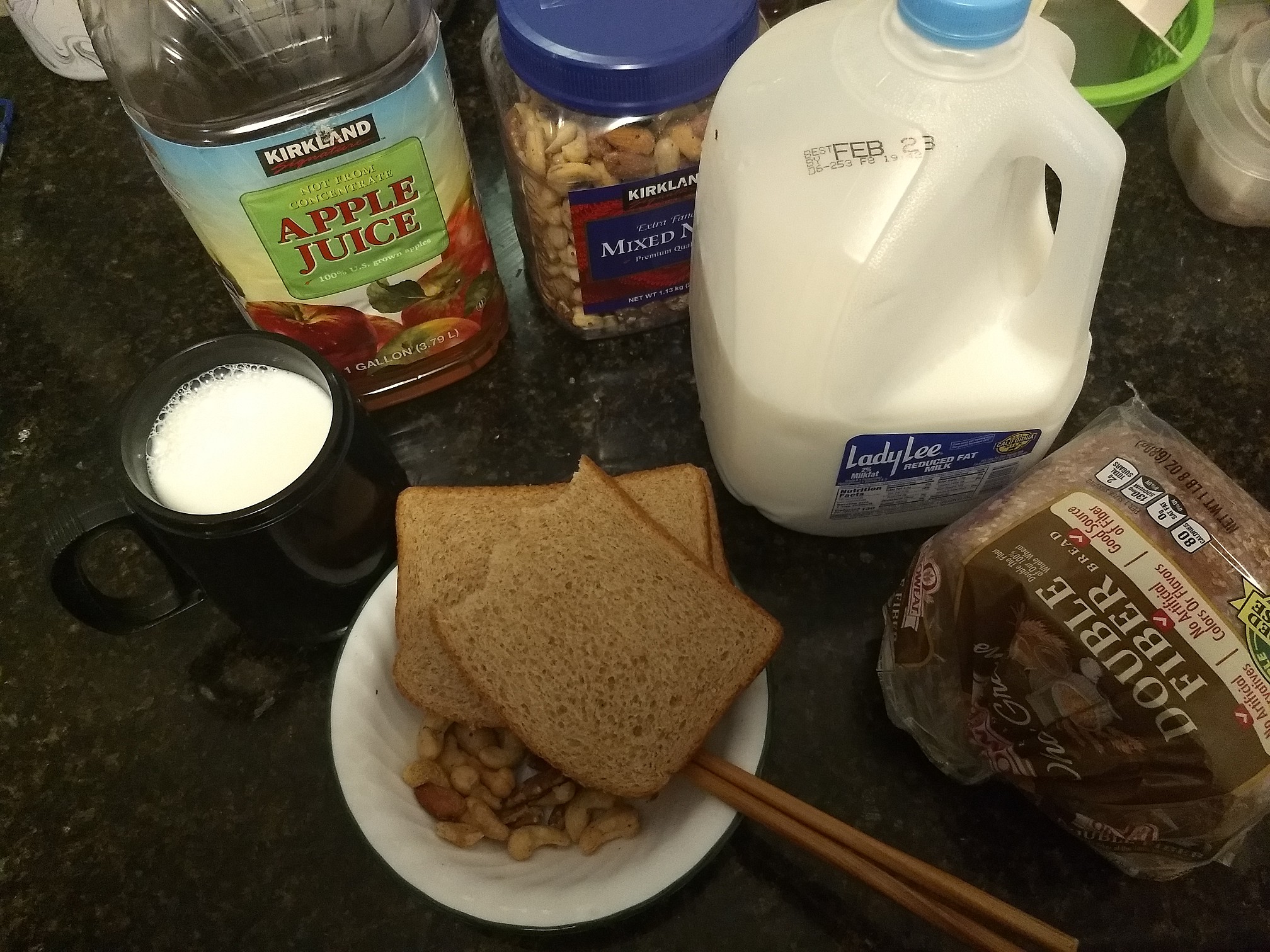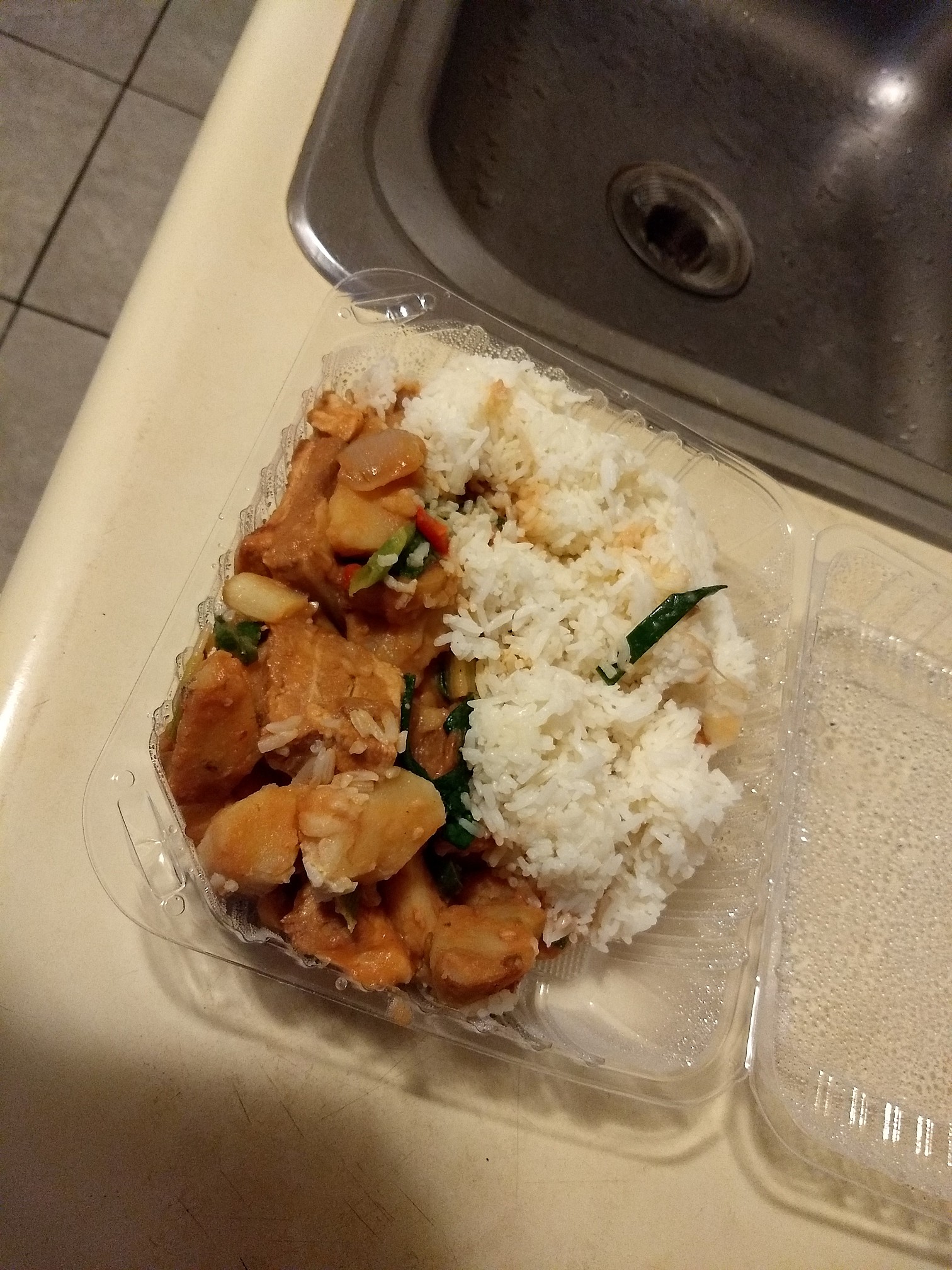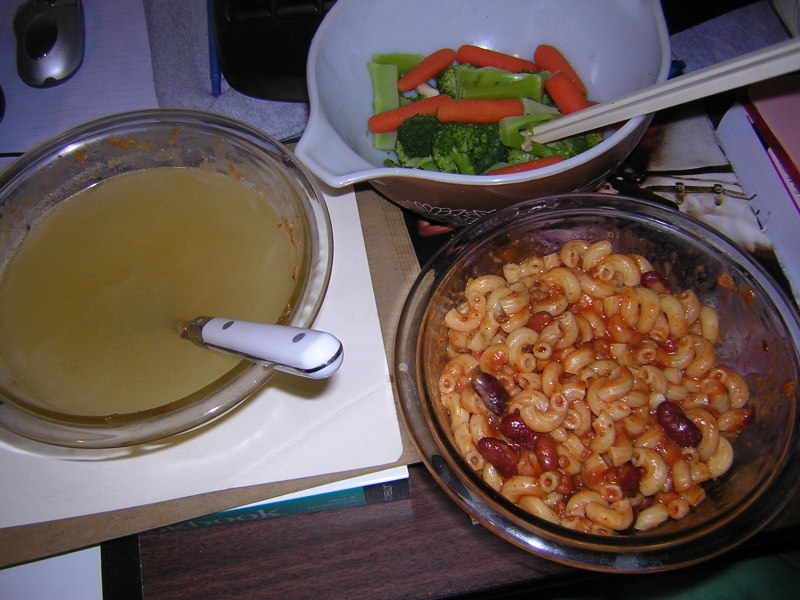Xah Lee Food, Monk Diet
Xah's Log: Food of a Genius
here's a video, in 2013, the lowest point of my life, suffering from hunger.

- https://youtu.be/GHr-5ktpQys
- Xah's Log: Food of a Genius
- Xah Lee
- May 3, 2013
three dollars per day diet
- btw, the principle of monk diet is that, u want max calories per dollar, but meanwhile, also max nutrition per dollar.
- so that, u can live on a $3 per day life in San Francisco Bay Area California for food, while, not sick
- this means, all sugar, snacks, McDonalds, faaaks, are gone.
- fresh fruit, and any meat, are basically gone too. cheese gone too.
- because if u include them, u can't make it $3 per day.
- i did for 10 years. roughly 2010 to 2020
- if u no care about the nutritional part, then, $3 is trivial. All u have to do, is eat donut all day, peanuts, peanut butter, and $1 burger at burger king. Drink sugared drinks. Gobble up white wonder bread.
- u'll die soon.
- yes. though beware, when u are exclusively on $3 per day diet, and doing cal per dollar thing, it's easy to fall into a trap, of eating the most fatty thing. namely, oil, peanut, peanut butter. you should eat them only fairly limited. need protein and carbo.
- also, most peanut butter sold in usa, are the sugared variety.
- i don't think i actually ever seen un-sugared. sure they exist if i looked.
- for example, another trivial way to max calories per dollar, is just to drink oil, any type. you'll max the calories per dollar, but u'll die.
- ---------------
- this is important. because, i don't think you'll ever find anyone in ur life doing the $3 per day thing, in usa, uk, australia, any developed country.
- to the average men in these wealthy countries, they'll think, ah olive oil is healthy, and etc, from the respect of their $20 per day diet.
- when u switch to the $3 per day, ur notion of heathy food kills u.
- such as the triangle r babbling about.
- when u r actually on a $3 per day diet, throw away ALL ur notion of healthy food.
- u can forget about olive oil, cuz u can't afford it. forget cheese, any type, forget about meat, forget about fresh veggies or fruit, except some such as banana, forget about "organic" faaaaak. etc.

this is my diet for much of 2010 to 2020.
when am lucky, i got food from roommate who works at restaurant, like this:

All my life since about 17 i've a unhealthy fascination with healthy diet, and my diet has been pretty much extremely healthy. In retrospect, i think some periods in my twenties my diet may be rather “too healthy” to the degree of lack of sufficient fat intake and over burden my liver in processing protein.
My diet selection choice is purely science oriented, and the motivation is basically wanting to be healthier, more athletic edge, and prolonged life. My life style, especially in the past 10 years, is pretty much ascetic. I'm not a nutritionist. My health food understandings are mostly garnered from readings (in my twenties often mass media such as newspapers, body building magazines, pop health books, but in later life more reliable resources (in the past few years, Wikipedia.)).
By self-reading, i learned that body needs protein, but can generate fat. So, i kinda developed the idea for few years in my twenties that i don't need fat intake. This is of course incorrect in so many ways and is dangerous.
The following is a list of food items i eat daily for the past 5 years.
- Milk (almost always fat free milk). On average perhaps 2 cups (500 ml) per day.
- Whole wheat bread. Almost every other day. (never white bread)
- Pasta. Almost every other day.
- Eggs white. (almost never egg yolk)
- Fruits. (mostly banana, orange, raisins, canned pineapple)
- Veggies (mostly broccoli (frozen, or in restaurants), mini carrots (fresh), tomatoes (usually canned), spinach (canned))
- Nuts. (mostly almonds, cashews, peanuts, pretty much every other day)
- Yogurt. (half of the time non-sweetened)
- Cheese. Typically processed cheese food (“Craft singles”), only because cheese are expensive.
- Pure fruit juices. Daily. Fresh is great, but i mostly drink from concentrated fruit juice. Grape juice, orange juice, apple juice, pineapple juice. I love them. Basically, pure fruit juice is my water source. That or milk and coffee and tea. I almost never drink just water by itself except when exercising. (i almost never drink sugared water, such as Pepsi, fruit flavored sugar water, etc.)
- Green tea. Maybe every other day.
- Coffee. Almost every day in the past year, but usually once or twice a week.
- Garlic. O yes. Basically every time i eat pasta, i have a clove of raw garlic.
- Turkey or ham slices.
- Misc snacks: chocolate, potato chips, cookies, ice cream, sometimes cakes and pie.

I do eat canned food. In fact, i almost eat canned food daily in the past decade, mostly veggies, sometimes fruits, but often canned tuna, and meat such as in chili.
I do eat meat. I love meat. However, i don't eat meat that much only because it requires cooking, and i'm too lazy to cook. I do eat a lot canned food that contains meat, such as chili (with turkey, chicken, beef), soup (e.g. Campbell of all sorts that has meat), canned pasta (with meat). Other times i buy turkey or ham slices for sandwiches. Canned food and ham slices are my main meat source at home, other than that is the occasional eating out, which i almost always have a meat dish. My meat choices are fowls, followed by bovines. I almost never eat pig, because nutritionally speaking, fowl's meat and cow's meat are better for the human body. I love fish too, especially salmon, but don't eat fish much because it requires cooking, and salmon is expensive.
I seldom drink alcohol. Possibly few times a year. I just don't like the taste of beer. I tried to really like red wine, but can't say i really like the taste. I do drink red wine now and then. I love the relaxing and inebriating effect of alcohol when with people, but i don't really find it enjoyable when by myself. I don't like how it makes me stupider. The occasion of socializing with other people is also very rare, maybe few times a year.
My diet before the last 5 years are pretty similar. I was born in 1968. Since i was 17 (1985), i started to live on my own, and eat on my own choices. From 17 to about 37 (2005), my diet is basically the same as above, except that i eat a lot more fruits, and often those protein products and artificial food drinks such as SlimFast (i drink it simply as a efficient food, not for losing weight. (My weight is basically on the low side of standard for my body frame size.)). I also take vitamins daily for periods of months, especially C, B, E. (was half-assed thinking to become a super human thru diet. Am somewhat of a “experiment on self” mad scientist type.) After 2005 (age 37), i started to eat more fat. For example, i started to buy 1%, 2% fat milk instead of insisting on 0% fat milk, and started to buy normal cheese instead of Craft's 0% fat cheese food, etc. I started to eat butter sometimes if i wanted to. Basically stopped always picking on the fat-free variety. My energy intake from fat sources is probably still less then 20% of all today. (In my 20s or early 30s, it is probably less that 10%) I also haven't taken vitamins or protein drinks as i used to. Most of these changes are basically due to me having mid-life crisis, getting older, and i have stopped doing athletic level activities as before (stopped doing any exercises since about 2004).
In general, the food i'm habituated to eat daily are those nutritionally dense, cheap, and don't require much preparation. How tasty it is doesn't matter much. As a principle, i made it so that i do not care much about taste. (the idea of eating a pill to fulfill food requirement is attractive to me) Often, i habituated myself to acquire a taste for foods that are supposedly healthy but not considered tasty by the general public. (i truely do love the taste of broccoli, whole wheat bread (and don't like white bread), and favor fowl meat than bovine or pig meat, and has been so for perhaps 2 decades.) However, this doesn't mean i don't like tasty cuisines. I love them. When i eat out, almost any menu item of any culture's dishes are satisfactory to me (can't take hot peppers though). I do not eat out often though. When i have money (typically from year 1987 to ~1992, in 1995, and from 1999 to 2003), i eat out maybe once or twice a week. In some short periods i might eat out daily, but then i would quickly avoid greasy dishes, finding them leaving a grease feeling in my stomach.
Note that i'm not fastidious about what i can or cannot eat. I do eat chocolate often, maybe once a month or few times a month, or sometimes any other thing that comes in occasion. I'm ok to eat just about anything that is generally consumed, and always happy to taste new things. One thing i eat frequently (perhaps monthly) that i think i shouldn't is potato chips or corn chips, typically those mass produced ( Pringles , Doritos).
Another thing about my eating habit is that i am a nibbler. I eat whenever, in small amounts. In general, basically 4 to 6 times a day.
Here's some random record of my diet i found in my file.
2004-10-28 1 can of Progresso wild rice chowder soup. 360. 3 pieces of bread. 210 590 ml of grape juice. 393 1 can of chicken veggie soup. 180 3 pieces of bread. 210 grapes. ~100 Total: 1453 -- 2004-10-26 1 can of soup.; 320 c 2 pieces of wheat bread; 140 c 590 ml of grape juice.; 393 c 1 can of soup.; 320 c 2 pieces of wheat bread; 140 c grapes. probably 200 c Total: 1513 c -- 2004-10-25 1 can of soup. 360. 2 eggs white. 100? some tofu dish. 100. 2.5 whole wheat bread. 70x2.5=175 480 ml grape juice. 320. 1 serving of spinach bread. 100 calories. 480 ml of tapioca milk tea. ~300. Progresso soup. 220. bread. 70*2.5 = 175. (accum: 1850) 1/5 cup cashew. 120. total: 1970 c
I despise the many types associated with healthy diet, such as those religious people who avoid cow meat (Hindus) or pig meat (Islamics, Christians), or those many types of vegetarians, some for Eastern religious causes (Buddhists), some for “animal rights” causes, and those who avoid tea/coffee (many Islamics). I also despise many modern hippies or yuppies type who are fixated about some “organic” food or “natural” food, holding some kind of hysterical belief against modern technology of food production or processing (such as Genetically modified food ).
Today i was reading some Wikipedia articles about grain, pasta.
- Whole grain
- Whole wheat flour
- Flour (basically cereal grain grinded to dust.)
- Pasta (noodle made from flour.)
Here's some quotes:
The word “whole” refers to the fact that all of the grain (bran, germ, and endosperm) is used and nothing is lost in the process of making the flour. This is in contrast to white, refined flours, which contain only the endosperm.
Whole wheat flour is more nutritious than refined white flour. However, in a process called food fortification, some micronutrients are added back to the white flour (required by law in some jurisdictions). Fortified white wheat flour does not, however, contain the macronutrients of the wheat's bran and germ (especially fiber and protein). Whole wheat is a good source of calcium, iron, fiber, and other minerals like selenium.
Whole grain products can be identified by the ingredient list. Typically, if the ingredient lists “whole wheat,” “wholemeal,” or “whole corn” as the first ingredient, the product is a whole-grain food item. On the other hand, terms such as “enriched” and “bromated,” among others, could indicate that the food lacks whole grain.
One other thing i learned today from Wikipedia is about Micronutrient and Macronutrient. Micronutrient are nutrients that are needed for small quantities. Vitamins and minerals are such. Macronutrient are nutrients needed in large quantities, to provide energy for example. Carbohydrates, protein, fat, are Macronutrient. This is great to know because i've always wondered about how to call the categorical difference between vitamins and minerals vs carbo and protein.
In the past year, i've started to eat oatmeal too. So, i wonder what exactly is a oat? Wikipedia comes to the rescue: Oat.
So, oat is a cereal grain grown for its seed. A cereal grain is: “grasses cultivated for their edible brans or fruit seeds”. So, basically oat is just a plant like rice and wheat. See Cereal, which list all the types.
The oatmeal i eat is the instant oat, which is just Rolled oats, which is basically the editable part of the grass pressed flat (as by a roller).
Note that oat is also a staple feed for cows and horses. Also, consider human animal's staple, the rice, wheat, barley, maize etc, it gives the insight that human animals also mull on grass, just like cows.
See also:
- Canning
- Pasteurization (basically heating for a short period to kill vast majority of pathogens)
- Homogenization (so that fat does not separate. )
- Food science
Among Wikipedia's articles on vegetarian, 2 of them i noticed are interesting to me. They are Economic vegetarianism and Environmental vegetarianism. Economic vegetarian is the belief that meat production, thru livestock industry, is rather inefficient with respect to producing food for human animals. For example, you can grow plants and eat the plants, but in order to eat cows, you have to grow and take care of it for many years, and you also have to grow the grass it eats. This idea is very interesting to me because i'm a efficiency nerd. The concept of environmental veggie eater is that the livestock industry produces pollution quiet severe as compared to cars and trucks. They believe that if we all eat veggies, it would be much more earth friendly. I'm not particular pro “Green” especially those radical political hippie yuppie yoga mysticism fuckheads, but i do love nature and earth, so this environmental vegetarian idea is also interesting.